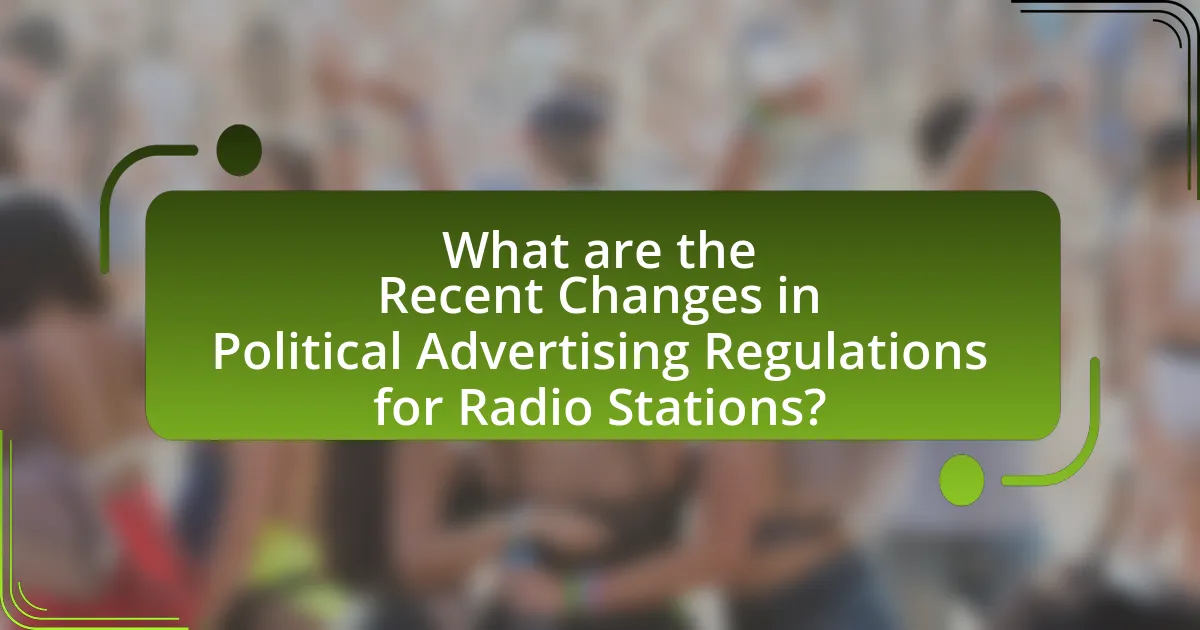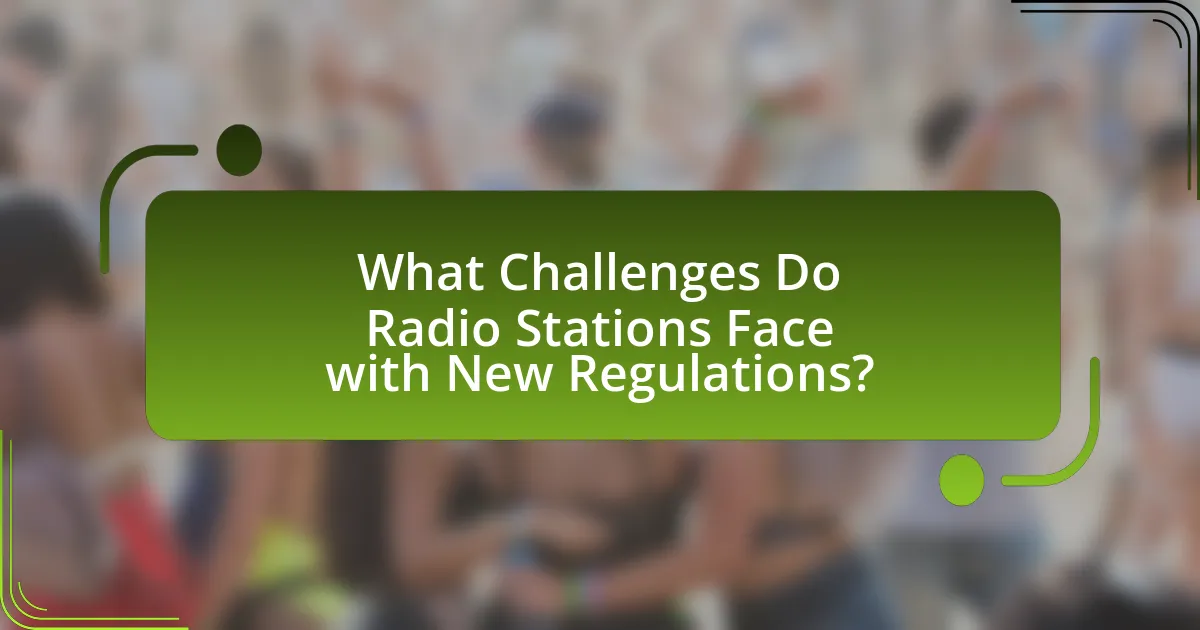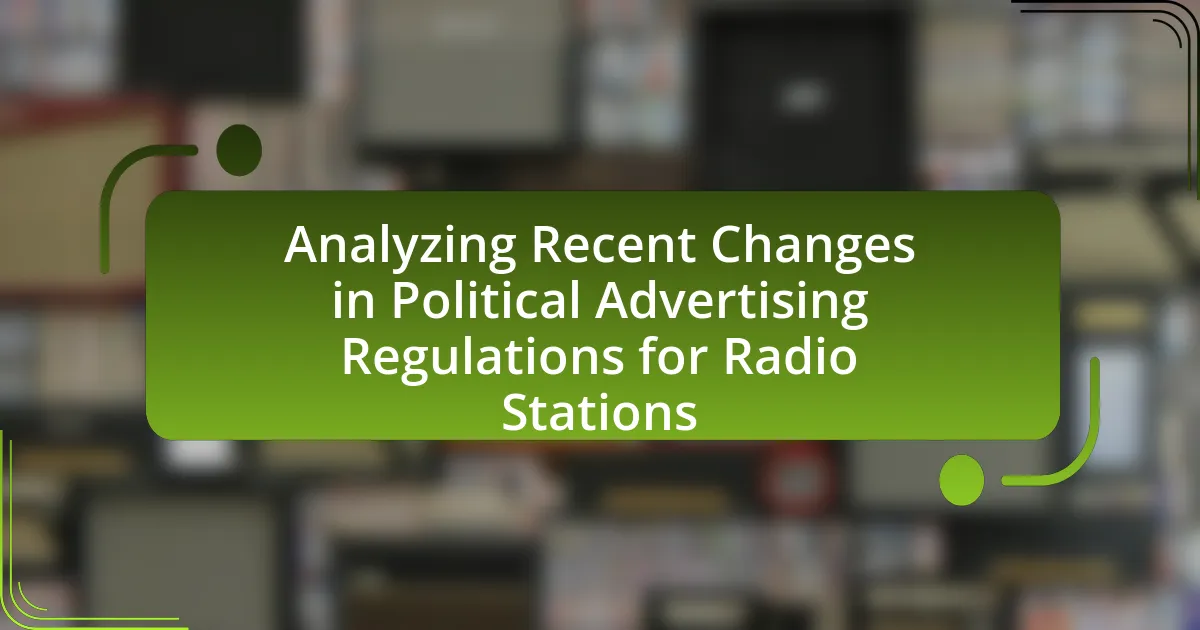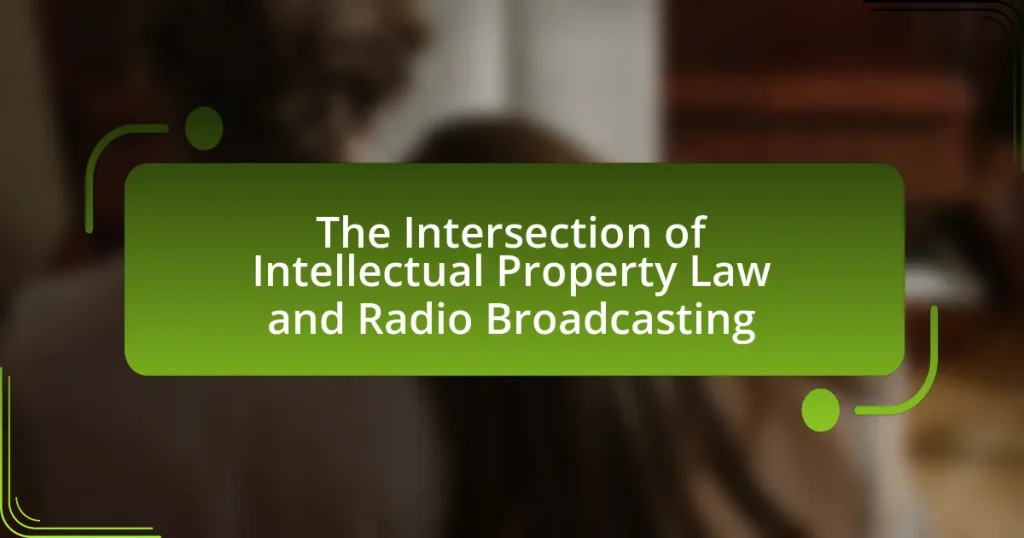The article focuses on recent changes in political advertising regulations for radio stations, primarily driven by new mandates from the Federal Communications Commission (FCC). Key updates include stricter disclosure requirements for sponsors of political ads, enhanced transparency measures, and the necessity for stations to maintain accessible public files documenting political ad purchases. These regulatory changes have significant implications for radio station operations, advertising costs for political campaigns, and voter engagement, as they promote accountability and aim to combat misinformation. The article also addresses the challenges radio stations face in adapting to these regulations and outlines best practices for compliance and ethical standards in political advertising.

What are the Recent Changes in Political Advertising Regulations for Radio Stations?
Recent changes in political advertising regulations for radio stations include the implementation of stricter disclosure requirements and enhanced transparency measures. The Federal Communications Commission (FCC) has mandated that radio stations must provide detailed information about the sponsors of political ads, including the identity of the individuals or organizations funding the advertisements. This change aims to combat misinformation and ensure that listeners are aware of the sources behind political messaging. Additionally, the regulations now require radio stations to maintain a public file that is easily accessible, documenting all political ad purchases and their respective sponsors, thereby promoting accountability in political advertising.
How have these changes impacted radio station operations?
Recent changes in political advertising regulations have significantly impacted radio station operations by increasing compliance costs and altering advertising strategies. Radio stations must now invest more resources in legal consultations and monitoring to ensure adherence to the new regulations, which can strain budgets, especially for smaller stations. Additionally, these changes have led to a shift in how stations approach political advertising, with a greater emphasis on transparency and disclosure, as mandated by the regulations. This shift can affect the volume and type of political ads that stations are willing to air, ultimately influencing their revenue streams and audience engagement.
What specific regulations have been altered or introduced?
Recent changes in political advertising regulations for radio stations include the introduction of stricter disclosure requirements for sponsors of political ads and the alteration of rules regarding the timing and frequency of such advertisements. The Federal Communications Commission (FCC) has mandated that radio stations must clearly identify the sponsors of political ads, ensuring transparency for listeners. Additionally, regulations have been updated to limit the number of political ads that can be aired in a specific time frame, aiming to reduce listener fatigue and enhance the quality of political discourse. These changes reflect ongoing efforts to adapt to the evolving landscape of political communication and advertising.
How do these changes affect advertising costs for political campaigns?
Changes in political advertising regulations for radio stations typically lead to increased advertising costs for political campaigns. This is primarily due to stricter compliance requirements and potential limitations on ad placements, which can reduce available inventory and drive up prices. For instance, when regulations mandate more transparency or equal access for candidates, stations may incur higher operational costs to manage these requirements, ultimately passing those costs onto advertisers. Additionally, historical data shows that when regulations tighten, the competition for ad slots intensifies, further inflating costs, as seen in the 2016 election cycle when new rules led to a significant rise in ad spending across various media platforms.
Why are these changes significant for political advertising?
These changes are significant for political advertising because they alter the regulatory landscape that governs how political messages are disseminated through radio stations. The new regulations enhance transparency by requiring clearer disclosures about funding sources for political ads, which can influence voter perception and trust. For instance, the Federal Communications Commission (FCC) has mandated that radio stations maintain a public file of all political ad purchases, allowing voters to access information about who is financing these messages. This increased transparency can lead to more informed voting decisions and potentially reduce the impact of misinformation in political campaigns.
What are the potential implications for political candidates?
The potential implications for political candidates include increased costs and strategic adjustments in their advertising campaigns. Recent changes in political advertising regulations for radio stations may require candidates to allocate more resources to comply with new transparency and disclosure requirements. For instance, candidates may need to invest in more sophisticated tracking and reporting systems to ensure compliance, which can divert funds from other campaign activities. Additionally, these regulations could limit the types of messages candidates can broadcast, potentially affecting their outreach and voter engagement strategies. Historical data shows that regulatory changes often lead to shifts in campaign tactics, as candidates adapt to maintain their competitive edge in the electoral landscape.
How might these changes influence voter engagement through radio?
Recent changes in political advertising regulations for radio stations may significantly enhance voter engagement by increasing the accessibility and diversity of political messages. These regulatory adjustments allow for more targeted advertising, enabling campaigns to reach specific demographics effectively. For instance, according to the Federal Communications Commission, the new rules facilitate lower-cost advertising options for smaller parties and independent candidates, which can lead to a broader range of viewpoints being aired. This increased exposure can motivate listeners to participate in the electoral process, as they become more informed about various candidates and issues. Additionally, the ability to air more frequent and varied political content can stimulate discussions among listeners, further driving engagement and turnout during elections.

What Challenges Do Radio Stations Face with New Regulations?
Radio stations face significant challenges with new regulations, particularly in the realm of political advertising. These challenges include increased compliance costs, as stations must invest in legal and administrative resources to ensure adherence to complex regulations. For instance, the Federal Communications Commission (FCC) has implemented stricter rules regarding transparency in political ad funding, requiring stations to maintain detailed records and make them accessible to the public. This not only demands additional staffing but also complicates the advertising process, potentially leading to reduced revenue as advertisers may seek platforms with fewer regulatory burdens. Furthermore, the evolving nature of regulations can create uncertainty, making it difficult for radio stations to plan long-term strategies effectively.
How can radio stations adapt to comply with these regulations?
Radio stations can adapt to comply with political advertising regulations by implementing robust monitoring systems to track ad content and ensure it meets legal standards. These systems can include software that flags non-compliant advertisements based on criteria set by regulatory bodies such as the Federal Communications Commission (FCC). Additionally, radio stations should provide training for their staff on the latest regulations, ensuring that all employees understand the requirements for political advertising. According to the FCC, compliance with these regulations is essential to avoid fines and maintain broadcasting licenses, highlighting the importance of proactive measures in adapting to regulatory changes.
What strategies can be implemented to ensure compliance?
To ensure compliance with political advertising regulations for radio stations, implementing a comprehensive training program for staff is essential. This program should educate employees about the specific legal requirements and ethical standards governing political advertising, including disclosure rules and content restrictions. Research indicates that organizations with robust compliance training experience a 50% reduction in violations compared to those without such programs. Additionally, establishing a clear internal review process for all political advertisements before airing can further mitigate risks, as it ensures that content is vetted for compliance with regulations. Regular audits of advertising practices can also help identify potential issues early, allowing for timely corrective actions.
What resources are available to assist radio stations in this transition?
Radio stations can access several resources to assist in the transition related to recent changes in political advertising regulations. Key resources include the Federal Communications Commission (FCC) guidelines, which provide detailed information on compliance with new advertising rules. Additionally, industry associations such as the National Association of Broadcasters (NAB) offer training programs, webinars, and legal resources to help stations navigate these changes effectively. Furthermore, consulting firms specializing in media law can provide tailored advice and support to ensure adherence to the updated regulations. These resources collectively equip radio stations with the necessary tools and knowledge to adapt to the evolving political advertising landscape.
What are the risks of non-compliance for radio stations?
The risks of non-compliance for radio stations include significant financial penalties, loss of broadcasting licenses, and reputational damage. Financial penalties can reach up to $10,000 per violation, as enforced by the Federal Communications Commission (FCC), which regulates broadcasting standards. Additionally, non-compliance can lead to the suspension or revocation of a station’s license, severely impacting its ability to operate. Reputational damage may result in loss of audience trust and advertiser confidence, further jeopardizing the station’s financial viability. These consequences underscore the importance of adhering to political advertising regulations to maintain operational integrity and public trust.
What penalties could radio stations face for violations?
Radio stations could face penalties such as fines, license revocation, or suspension for violations of political advertising regulations. The Federal Communications Commission (FCC) enforces these regulations, and non-compliance can result in financial penalties that may reach thousands of dollars per violation. For instance, in 2020, the FCC imposed a $1.5 million fine on a radio station for failing to maintain proper public inspection files related to political advertising. Such enforcement actions underscore the importance of adhering to established guidelines to avoid significant repercussions.
How can radio stations mitigate these risks effectively?
Radio stations can effectively mitigate risks associated with recent changes in political advertising regulations by implementing comprehensive compliance programs. These programs should include regular training for staff on the latest regulations, ensuring that all advertising content is reviewed for compliance before airing. For instance, the Federal Communications Commission (FCC) mandates that political ads must disclose funding sources, and failure to comply can result in significant fines. By establishing a clear process for vetting political advertisements and maintaining accurate records of all ads aired, radio stations can reduce the likelihood of regulatory violations and associated penalties.

What Best Practices Should Radio Stations Follow in Political Advertising?
Radio stations should adhere to transparency, accuracy, and equal opportunity when engaging in political advertising. Transparency involves clearly disclosing the source of funding for political ads, ensuring listeners understand who is behind the message. Accuracy requires that all claims made in political advertisements are fact-checked and substantiated to avoid misleading the audience. Equal opportunity mandates that radio stations provide all candidates equal access to advertising time, as stipulated by the Federal Communications Commission (FCC) regulations. These practices not only comply with legal standards but also foster trust and credibility with the audience.
How can radio stations ensure transparency in political advertising?
Radio stations can ensure transparency in political advertising by maintaining clear records of all political ad purchases and making this information accessible to the public. This practice aligns with the Federal Communications Commission (FCC) regulations, which require stations to keep a public file that includes details such as the identity of the sponsor, the amount paid, and the dates of broadcast. By adhering to these regulations, radio stations not only comply with legal standards but also foster trust among listeners by providing insight into the political advertising landscape.
What disclosure requirements must be met for political ads?
Political ads must disclose the identity of the sponsor and the source of funding. The Federal Election Commission (FEC) mandates that political advertisements include a clear statement indicating who paid for the ad, such as “Paid for by [Sponsor’s Name].” Additionally, if the ad is produced by a candidate’s campaign, it must include a disclaimer stating that it was authorized by the candidate. These requirements ensure transparency and accountability in political advertising, helping voters understand the origins of the messages they receive.
How can radio stations maintain ethical standards in political advertising?
Radio stations can maintain ethical standards in political advertising by adhering to transparency, accuracy, and fairness in their content. Transparency involves clearly disclosing the sources of funding for political ads, ensuring that listeners are aware of who is behind the messages. Accuracy requires that radio stations fact-check the claims made in political advertisements to prevent the dissemination of misinformation. Fairness entails providing equal opportunities for all candidates to advertise, thus avoiding favoritism. According to the Federal Communications Commission (FCC) regulations, radio stations must keep a public file of all political ads, which reinforces accountability and ethical practices in political advertising.
What tools and technologies can assist in managing political advertising?
Tools and technologies that assist in managing political advertising include digital advertising platforms, data analytics software, and customer relationship management (CRM) systems. Digital advertising platforms like Google Ads and Facebook Ads enable targeted ad placements based on demographic and behavioral data, allowing campaigns to reach specific voter segments effectively. Data analytics software, such as Tableau or Google Analytics, provides insights into ad performance and audience engagement, helping to optimize strategies in real-time. CRM systems, like Salesforce, facilitate the management of voter outreach and engagement, ensuring that campaigns can track interactions and tailor communications effectively. These tools collectively enhance the efficiency and effectiveness of political advertising efforts, particularly in the context of evolving regulations.
What software solutions are available for tracking political ad compliance?
Software solutions available for tracking political ad compliance include AdImpact, iSpot.tv, and Political Ad Tracker. AdImpact provides comprehensive tracking of political advertisements across various media platforms, ensuring compliance with federal and state regulations. iSpot.tv offers real-time analytics and insights into political ad spending and placements, helping organizations adhere to compliance requirements. Political Ad Tracker specializes in monitoring political ads on television and digital platforms, providing detailed reports that assist in maintaining compliance with advertising laws. These tools are essential for navigating the complex landscape of political advertising regulations.
How can data analytics improve political advertising strategies for radio stations?
Data analytics can significantly enhance political advertising strategies for radio stations by enabling targeted messaging and audience segmentation. By analyzing listener demographics, preferences, and behaviors, radio stations can tailor their political ads to resonate with specific voter segments, increasing engagement and effectiveness. For instance, a study by the Pew Research Center found that targeted advertising can lead to a 30% increase in voter turnout among specific demographics when messages are aligned with their interests. Additionally, real-time data analytics allows stations to adjust their advertising strategies based on listener feedback and engagement metrics, ensuring that campaigns remain relevant and impactful throughout the election cycle.
What are the key takeaways for radio stations navigating new regulations?
Radio stations must prioritize compliance with new political advertising regulations to avoid penalties and maintain operational integrity. Key takeaways include understanding the specific requirements for disclosure and transparency in political ads, as mandated by the Federal Communications Commission (FCC). Stations should implement robust tracking systems to monitor ad content and ensure adherence to the new rules. Additionally, training staff on these regulations is essential to foster a culture of compliance. Historical context shows that failure to comply can result in significant fines, as seen in past FCC enforcement actions. Therefore, proactive measures are crucial for radio stations to navigate these regulatory changes effectively.



